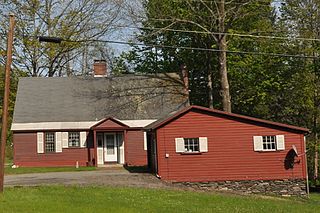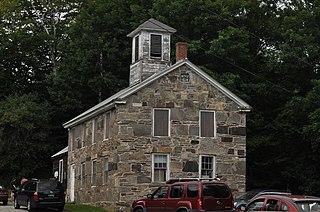
The Lord & Burnham Building, located at the corner of Main and Astor Streets in Irvington, New York, United States, is a brick building in the Queen Anne architectural style built in the 1880s. In 1999 it was listed on the National Register of Historic Places, and was added as a contributing property to the Irvington Historic District in 2014.

The King Block is a historic apartment house at 117 High Street, Barton, Vermont, United States. It was added to the U.S. National Register of Historic Places on July 20, 2002. Built in 1870 and expanded several times, it is a well-preserved example of tenement-style worker housing of the late 19th century.

The Daniel Morse III House is a historic First Period house at 210 Farm Road in Sherborn, Massachusetts. With its oldest portion dating to about 1710, it is one of the town's oldest surviving buildings. It was listed on the National Register of Historic Places in 1986.

The Longfellow School, also known as Church Street School, is a historic school building at 6 Church Street in Rutland, Vermont. Built in 1890, it was the first purpose-built graded school in the city, serving as a model for later schools. It was listed on the National Register of Historic Places in 1976. It now houses the administrative offices of the city schools.

The Stone Farm is a historic farmhouse on Old Marlborough Road in Dublin, New Hampshire. Built about 1806 with several 19th-century alterations, it is a well-preserved example of a period farmhouse. The property was listed on the National Register of Historic Places in 1983.

The Greeley House is a historic First Period house on New Hampshire Route 108, east of the center of East Kingston, New Hampshire. Built about 1718, it is one of the community's oldest surviving buildings, and a distinctive and visible reminder of its largely agrarian past. The house was listed on the National Register of Historic Places in 1980.

The William Harris House, also known locally as the Joseph Caruso House, is a historic house on Western Avenue in Brattleboro, Vermont. Built in 1768, this Cape-style house is believed to be the oldest surviving building in the town, and one of the oldest in the entire state. It was listed on the National Register of Historic Places in 1978.

The Vernon District Schoolhouse No. 4 is a historic school building at 4201 Fort Bridgman Road in Vernon, Vermont. Built 1848, it is a well-preserved mid-19th century brick district school, which now serves as a local historical museum. It was listed on the National Register of Historic Places in 2005.

The Asahel Kidder House, is an historic house at 1108 South Main Street in Fair Haven, Vermont. Built about 1843, by the efforts of a prosperous local farmer, it is a remarkably sophisticated expression of Greek Revival architecture for a rural setting. It was listed on the National Register of Historic Places in 1997.

The South Reading Schoolhouse is a historic school building at Tyson and Bartley Roads in Reading, Vermont. Built in 1834, it is a distinctive example of the regional "snecked masonry" style, and the oldest known structure of the style to survive. It was used as a school until 1970, and was listed on the National Register of Historic Places in 1983.

Salisbury Town Hall is a historic municipal building at Maple and Prospect streets in Salisbury, Vermont. Built in 1869, it is a fine local example of Greek Revival architecture, and has served the rural community in a variety of ways: as town hall, library, and as educational facility. It was listed on the National Register of Historic Places in 1995.

The Paris and Anna Fletcher House is a historic house on Vermont Route 22A in Bridport, Vermont. Built about 1813 and enlarged in the 1820s, it is a fine local example of late Federal architecture, with a distinctive shallow Doric portico. It was listed on the National Register of Historic Places in 1999, and now houses the local historical society.

The Grand Isle County Courthouse is located at 3677 United States Route 2 in the center of North Hero, the county seat of Grand Isle County, Vermont. Built in 1824, it is one of the oldest surviving courthouses in the state, and the only surviving one built out of stone. It was listed on the National Register of Historic Places in 1996.

44 Front Street in Burlington, Vermont is a well-preserved vernacular Queen Anne Revival house. Built about 1860 and significantly altered in 1892, it is representative of two periods of the city's growth in the 19th century. It was listed on the National Register of Historic Places in 2008.

The Chauncey B. Leonard House is a historic house on Shed Road at Crosstown Road in Berlin, Vermont. Built about 1845, it is one of the oldest houses in Berlin, built in the Berlin Corners area that was once the town center. It was listed on the National Register of Historic Places in 1995.

The Montgomery House is a historic travel accommodation on Vermont Route 118 in the center of Montgomery, Vermont. Built in 1803, it is one of the town's oldest buildings, and it served for many years as a social and civic center in the small community. It was listed on the National Register of Historic Places in 1992.

The Richmond Underwear Company Building is a historic industrial facility at 65 Millet Road in Richmond, Vermont. Built in 1900, it was the town's first major industrial facility, bringing an economic boom to the town. The factory was used for the manufacture of underwear until 1946, and has seen a variety of industrial and commercial uses since then. It was listed on the National Register of Historic Places in 1992.

The Sweat-Comings Company House is a historic two-family house at 10–12 Powell Street in Richford, Vermont. Built in 1909, it is a rare surviving example of an early company-built boarding house. It was sold into private ownership in 1924, and is a good local example of vernacular Colonial Revival architecture. It was listed on the National Register of Historic Places in 2004.

143 Highland Avenue is a well-preserved late 19th-century tenement house in the town of Hardwick, Vermont. It was built about 1889 to serve as housing for workers in the area's granite quarries, and preserves a number of the utilitarian features that characterize these types of worker housing. It was listed on the National Register of Historic Places in 2000.

The Orleans County Courthouse and Jail Complex is a historic government facility on Main Street in the city of Newport, Vermont, the shire town of Orleans County. The complex includes a fine Romanesque courthouse built in 1886, a wood-frame jailer's quarters built in 1886, and a 1903 brick jail. The complex was listed on the National Register of Historic Places in 1984.























